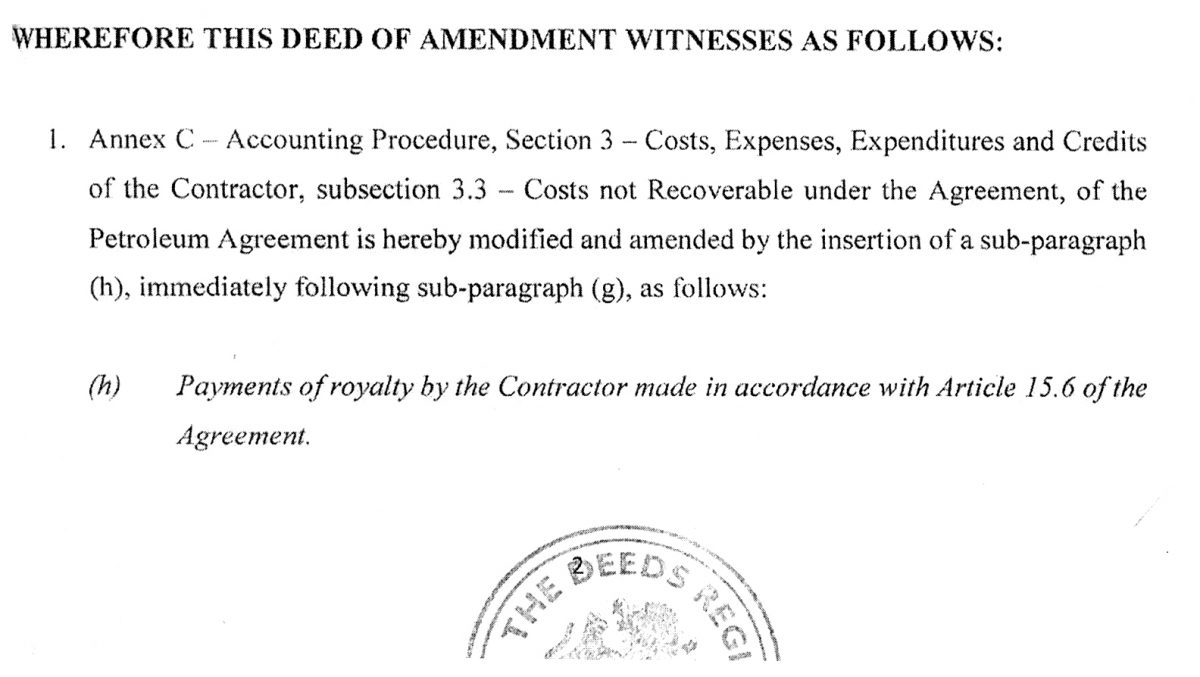With the disclosure that the David Granger-led government and the ExxonMobil Guyana and its partners amended the controversial 2016 Production Sharing Agreement (PSA), main opposition spokesman on the oil and gas sector David Patterson has said that while it is proof that the existing contract can be renegotiated, it requires the necessary political will.
“The actions of the APNU+AFC government clearly demonstrates that if the parties to the contract are willing, a review and renegotiation of the existing contract can be undertaken. This, of course, requires the necessary political will,” Patterson told a press conference as he made reference to the amendment uncovered by chartered accountant and attorney Christopher Ram.
Ram on Thursday secured a copy of an addendum to the PSA, which was amended in April, 2019, to make clear that ExxonMobil Guyana and its partners could not reclaim the 2% royalty due to Guyana as costs. As a result, Ram said that the amendment sets a precedent that the contract can be renegotiated.
“The question inevitably arises why the current Administration keeps repeating the mantra of sanctity of contract, driving fear into Guyanese of the consequence of any attempt at renegotiation. Interestingly, the APNU+AFC’s renegotiation was conducted without a change in circumstances, while the incumbent Administration is adamant that it is powerless to even broach the question with the oil companies,” Ram noted in his column, ‘The Road to First Oil,’ published in Friday’s Stabroek News.
Patterson said that Ram’s column confirmed what his party had been saying all along—that the royalty payments were not cost recoverable and that the 2016 contract was in fact based on the 2012 model PSA as prepared by the PPP/C.
The addendum to the agreement was signed by then President Granger proscribing the reclaiming of the 2% royalty. Both the former APNU+AFC administration and the current government have cited the sanctity of the 2016 PSA in response to public calls for its renegotiation.
Ram, however, argued that the 2019 amendment paves the way for a fundamental reshaping of the 2016 PSA to right the injustices done to the country and the poor terms which had been imposed on Guyana.
While Granger and former Head of the Department of Energy Dr. Mark Bynoe, who were signatories to the addendum, could not be reached for comment, main opposition coalition partner the Alliance for Change (AFC) on Friday agreed that the amendment was demonstrative that a renegotiation can be done.
However, the party was quick to point out that it would only happen if both parties are willing and there is political will.
In light of the addendum being made public, questions have been raised as to why the document had not been made public before given that the past administration had promised to be forthright about the petroleum sector, following the disgrace surrounding the silence of signing the controversial 2016 PSA.
This newspaper tried contacting former Minister of State Joseph Harmon and Bynoe to no avail. Calls and messages to their mobile numbers went unanswered.
It is still unclear how contact can be made with former President Granger, who has maintained a low profile since his loss at the 2020 elections was stained by allegations of attempts at rigging by the then governing coalition.
The timing of the addendum is also notable as it occurred during a period when the former APNU+AFC government had fallen to a No-Confidence Motion and was operating as a caretaker administration, raising questions about the appropriateness of such an engagement.
Stabroek News contacted ExxonMobil Guyana about the circumstances surrounding its decision to be party to the amendment and was told to send an email. The email was sent but up to press time there had been no response.
Defending the decision, Patterson said that at the time of the signing, President Granger was in a substantive position and also continued to hold responsibility for the sector.
“It should be noted that between May 2015 and January 2016, the Minister responsible for petroleum was former president Granger. Between January 2016 and July 2018, the responsible minister was Raphael Trotman. From August 2018, this portfolio reverted back to former president Granger,” he noted.
“This amendment was penned under former president Granger’s stewardship. While being previously unaware of this amendment, it is assumed that despite it being always known, accepted that any royalty payment was not cost recoverable, the parties may have wanted to make this more pellucid before oil production commenced,” he added.
For his part, Ram has said that the coalition must be given some credit “for at least effecting the renegotiation of one element of the Agreement, albeit not a particularly major one”.
Ram said that the nation, which is facing price increases in every area including the energy sector, should pressure all stakeholders to ensure that the contract is renegotiated, as he faulted both sides for the current situation the country is in.
“It is both the PPP/C and the APNU+AFC that have given Guyana this abominable contract. Contrary to what Vice President Jagdeo said a few nights ago on the Glenn Lall Show, the 2016 Production Sharing Agreement was based on the Robert Persaud–Donald Ramotar 2012 Model. How can we better manage a contract when we know not its origin, its content, or its implications?” he questioned.
“Indeed, it is still my strongly held view, that Esso was not entitled to a second Agreement. We may not be able to reverse the 2016 Agreement, but that should not mean that we have to prostrate ourselves at the feet of Esso, Hess and CNOOC, as our leaders are doing. Let us take the example of the APNU+AFC and demand renegotiation,” he added.






